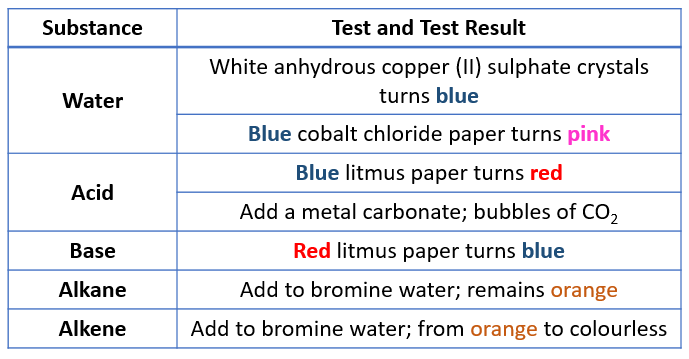

Identify Hydrocarbons and Others
Related Topics:
More Lessons for IGCSE Chemistry
Math Worksheets
A series of free IGCSE Chemistry Activities and Experiments (Cambridge IGCSE Chemistry).
The following table shows the tests for water, acids, bases, alkanes and alkenes.
Alkenes changes the bromine water from brown to colourless.
Alkanes do not react with the bromine water. Testing for the presence of water
Water will turn anhydrous copper(II) sulfate from white to blue and anhydrous cobalt(II) chloride from blue to pink.
To decide whether it is pure water, test to show that the boiling point is exactly 100°C. Test for ethanol and ethanoic acid
Ethanol and ethoic acid reacts with each other, with the addition of a few drops of concentrated sulfuric acid, to produce a sweet-smelling ester.
Chromatography
Chromatography can be used for separating coloured substances. It can also be used to separate amino acids (monomers) from proteins and sugars from carbohydrates. Since these compounds are colourless, the spots must be detected using locating agents. If a sample gives only a single spot, then it is an indication that it might be pure. It would be better to check, using different solvents for confirmation.
The identity of the compound can be confirmed by measuring the Rf value in the solvent being used.
Paper and Thin Layer Chromatography Chromatography for Amino Acids Chromatography for Sugars


More Lessons for IGCSE Chemistry
Math Worksheets
A series of free IGCSE Chemistry Activities and Experiments (Cambridge IGCSE Chemistry).
The following table shows the tests for water, acids, bases, alkanes and alkenes.

Alkenes changes the bromine water from brown to colourless.
Alkanes do not react with the bromine water. Testing for the presence of water
Water will turn anhydrous copper(II) sulfate from white to blue and anhydrous cobalt(II) chloride from blue to pink.
To decide whether it is pure water, test to show that the boiling point is exactly 100°C. Test for ethanol and ethanoic acid
Ethanol and ethoic acid reacts with each other, with the addition of a few drops of concentrated sulfuric acid, to produce a sweet-smelling ester.
Chromatography
Chromatography can be used for separating coloured substances. It can also be used to separate amino acids (monomers) from proteins and sugars from carbohydrates. Since these compounds are colourless, the spots must be detected using locating agents. If a sample gives only a single spot, then it is an indication that it might be pure. It would be better to check, using different solvents for confirmation.
The identity of the compound can be confirmed by measuring the Rf value in the solvent being used.
Paper and Thin Layer Chromatography Chromatography for Amino Acids Chromatography for Sugars
Try the free Mathway calculator and
problem solver below to practice various math topics. Try the given examples, or type in your own
problem and check your answer with the step-by-step explanations.



We welcome your feedback, comments and questions about this site or page. Please submit your feedback or enquiries via our Feedback page.